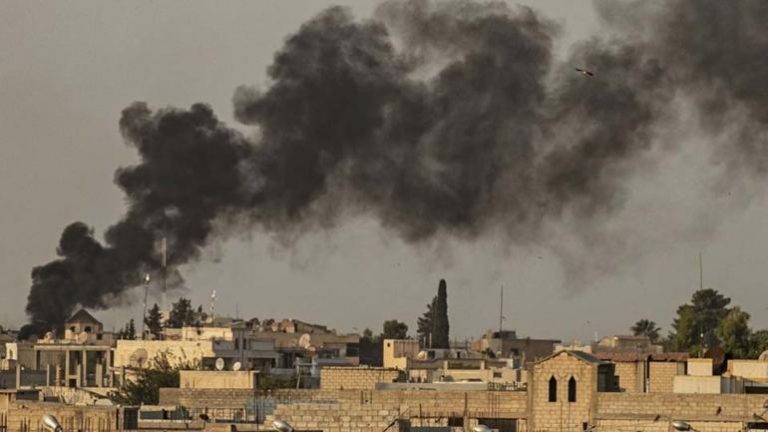Turkey warplanes have bombed parts of north-eastern Syria at the start of an offensive which could lead to conflict with Kurdish-led allies of the US.
Turkey’s President Recep Tayyip Erdogan said the operation was to create a “safe zone” cleared of Kurdish militias which will also house Syrian refugees.
Several locations were hit, and at least two civilians died, the Kurdish-led Syrian Democratic Forces (SDF) said.
It vowed to resist any Turkish advance across the border.
Amid growing humanitarian concerns, the SDF asked the US-led coalition against the jihadist group Islamic State (IS) to establish a no-fly zone in the area to stop “attacks on innocent people”.
The Kurds – key US allies in defeating IS in Syria – guard thousands of IS fighters and their relatives in prisons and camps in areas under their control and it is unclear whether they will continue to be safely detained.
The offensive was launched just days after President Donald Trump controversially withdrew US troops from the border area, a decision announced after a phone call with Mr. Erdogan that was widely condemned at home and abroad.
In a statement, Mr. Trump – who had threatened to “obliterate” Turkey’s economy if it went “off-limits” in the incursion – said the US did not “endorse this attack and has made it clear to Turkey that this operation is a bad idea”.
READ ALSO: Brexit: Special Sitting For MPs To Decide The Future Of UK
What is Turkey’s plan?
On Twitter, Mr. Erdogan said the mission “was to prevent the creation of a terror corridor across our southern border and to bring peace to the area” vowing to “preserve Syria’s territorial integrity and liberate local communities from terrorists.”
The scale of the long-threatened offensive – Turkey’s third military operation in northern Syria in three years – was not yet clear, and there was no information on whether Turkish ground forces had attempted to enter Syria.
Several towns and villages were hit by airstrikes and artillery fire, and residents were said to be fleeing the towns of Ras al-Ain and Tal Abyad. Two civilians had been killed and two others injured in Misharrafa, west of Ras al-Ain, the SDF said.
Turkey considers the Kurdish YPG militia – the dominant force in the SDF – an extension of the banned Kurdistan Workers’ Party, which has fought for Kurdish autonomy in Turkey for three decades.
The Turkish government plans to create a “safe zone” without Kurdish militias – regarded by Ankara as terrorists – which will also accommodate two million of Turkey’s 3.6 million Syrian refugees.
What has the international reaction been?
The UK and France planned to request an emergency meeting of the UN Security Council to discuss the situation, and European Commission President Jean-Claude Juncker urged Turkey to “halt its military operation”.
Nato Secretary-General Jens Stoltenberg said Turkey had “legitimate security concerns” but that he expected the country to “act with restraint and to ensure that any action… is proportionate and measured.
US Senator Lindsay Graham, a close ally of Mr. Trump, said he would lead an effort in Congress to “make Erdogan pay a heavy price”, adding: “Pray for our Kurdish allies who have been shamelessly abandoned by the Trump Administration.”
In his statement, Mr. Trump also said Turkey would be responsible for ensuring that suspected IS fighters being held captive remained in prison and that IS did not regroup.
How would an incursion affect the IS situation?
The SDF says it is detaining more than 12,000 suspected IS members in seven prisons, and at least 4,000 of them are foreign nationals. The exact locations have not been not revealed, but some are reportedly close to the Turkish border.
Two camps – Roj and Ain Issa – holding families of suspected IS members are inside the “safe zone”. On Wednesday, IS militants reportedly carried out three suicide attacks in their former de facto capital of Raqqa. There was no confirmation of casualties.










